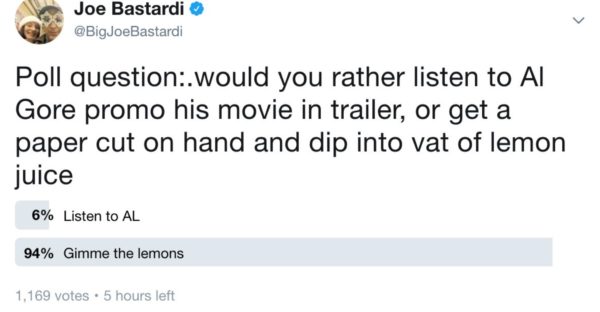Almost ten years ago, not long after Al Gore’s first entry into the slasher/horror film genre (An Inconvenient Truth), I had occasion to ask a straight-shooting “mainstream” climate scientist I know slightly what he thought of Gore’s film. I was fishing to see whether he’d comment on some of the more obvious howlers that Gore included in the film, but instead after a long pause he said, “I wish he’d made the film with John McCain.” In other words, Gore should have tried to make it a bipartisan effort. McCain is the perfect person and is so vain that he surely would have done it. He had, at that point, sponsored two greenhouse gas emissions-trading bills with Democratic senators, and also a bill with John Kerry to mandate much higher mileage standards in the American car fleet (22 Senate Democrats voted against that proposal, incidentally).
Now that Gore is out with a sequel (that is bombing at the box office, so there probably won’t be a sequel Oscar in Gore’s future), it is worth taking in the reflections of two young political scientists at the University of British Columbia who conclude that Gore’s efforts on behalf of climate change have only succeeded in polarizing the issue, and set back the cause of climate action.
“An Inconvenient Truth about ‘An Inconvenient Truth’” has some interesting findings that run counter to the slogans of the climatistas:
However, 11 years after its release, there is also evidence that it might have had an unintended consequence: serving as a catalyst in the polarization of American public opinion on climate change.
We have studied in detail how the media covered the issue of climate change since the 1980s and how it may have played a role in polarizing the American public. The commonly observed pattern is that public opinion tends to follow, rather than lead, debate among political elites. . .
What we found is a nuanced story that sheds considerable light on why the public polarized on climate change. First, politicians became increasingly common in coverage, politicizing the issue as it grew in importance. As a result, the public has been exposed to a growing number of messages about climate change from party elites.
Second, When one side’s messages are clear and the other side’s are muddled, as was the case here, it’s plausible that Republican voters took their cues from Democrats. This should not be surprising. In an age of affective polarization where Republicans and Democrats each increasingly dislike the other, it makes sense that Republicans may have taken an oppositional stance on climate change, at least partly, in response to signals from Democratic elites.Democratic messages have been more common in news coverage, and, unsurprisingly, consistent in a pro-climate direction. Meanwhile, Republican messages have been fewer in number, and, until the Obama presidency, ambiguous in direction. Contrary to conventional wisdom, only a small fraction of Republican messages on climate change explicitly denied the scientific consensus on climate change.
When one side’s messages are clear and the other side’s are muddled, as was the case here, it’s plausible that Republican voters took their cues from Democrats. This should not be surprising. In an age of affective polarization where Republicans and Democrats each increasingly dislike the other, it makes sense that Republicans may have taken an oppositional stance on climate change, at least partly, in response to signals from Democratic elites.
A couple of observations. First, what this study suggests is that Al Gore is the best friend climate skeptics ever had. Here’s to hoping Gore makes many more sequels to An Inconvenient Truth. With enemies like him, who needs enemies? Second, the first bolded sentence above—”Democratic messages have been more common in news coverage”—should not surprise us in the least, since the media is the echo chamber of the Democratic Party and most environmental “reporters” are just stenographers for activist group talking points. But in an age when public trust in the media is in free fall, how smart was this if you’re a sincere climate change worrier?
This passage from the story is especially interesting:
For example, Al Gore was featured in 48 per cent of climate change stories on Fox News in 2006 and in 57 per cent in 2007. There were explicit references to the movie in 28 per cent of the stories in 2006 and 17 per cent of the stories in 2007. On the other hand, a leading Republican climate change denier, Sen. Jim Inhofe, was not featured in a single story on Fox News in 2006 and in only one per cent of the stories in 2007.
The traditional media also focused heavily on Al Gore. In 2006 and 2007, the former U.S. vice-president was featured in 13 per cent and 17 per cent of news stories in the highest circulation newspapers in the United States, and in 16 per cent and 23 per cent of the network broadcasts.
In other words, if you tuned in to news about climate change in that time period, you were exposed to Al Gore and his message. And even though that message was unabashedly pro-climate and for strong climate action, it likely played a role in turning Republicans against that message, since to them, Gore was simply a Democratic politician they disliked.
In other words, the best way to stop climate action is to give Gore more air time. And memo to Hillary Clinton: please please please make a movie about climate change. It would probably kill off the issue once and for all.
Also this:

Notice: All comments are subject to moderation. Our comments are intended to be a forum for civil discourse bearing on the subject under discussion. Commenters who stray beyond the bounds of civility or employ what we deem gratuitous vulgarity in a comment — including, but not limited to, “s***,” “f***,” “a*******,” or one of their many variants — will be banned without further notice in the sole discretion of the site moderator.